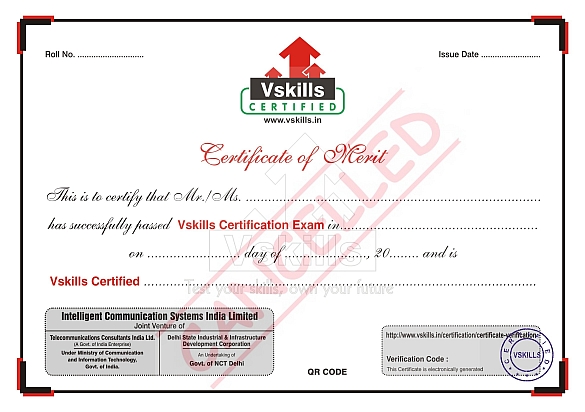- Duration / Course length: 1 To 2 Months Start now
- Certificates:
- Course delivery: This course is delivered in video format
Course details
Environmental Health and Safety (EHS) is a field that focuses on protecting human health and the environment in various settings, particularly within workplaces. It involves identifying, assessing, and mitigating risks associated with environmental factors, occupational hazards, and safety concerns to ensure the well-being of employees and the surrounding environment.
Note: Please note that only assessment is provided and no learning resources will be provided.
Why should one take Environmental Health and Safety (EHS) Certification?
Obtaining a certificate in Environmental Health and Safety (EHS) can be valuable for individuals interested in pursuing careers in environmental health and safety, as well as for those who want to enhance their knowledge and skills in this specialized field. Here are several reasons why one might consider taking a certificate program in environmental health and safety:
- Career Advancement: A certification can enhance career prospects by demonstrating expertise and commitment to EHS practices.
- Compliance: Many industries require compliance with EHS regulations, and a certification ensures understanding and adherence to these standards.
- Risk Mitigation: Training in EHS helps prevent accidents, reduces liabilities, and improves overall safety culture in workplaces.
Who will benefit from taking Environmental Health and Safety (EHS) Certification?
A certificate in Environmental Health and Safety (EHS) can be beneficial for a wide range of individuals who have an interest in health and safety. Here are some groups of people who can benefit from taking a certificate in Environmental Health and Safety (EHS):
- EHS Professionals: Individuals already working or aspiring to work directly in the field of environmental health and safety. The certificate program enhances their expertise, providing up-to-date knowledge and skills necessary for their roles.
- Managers and Supervisors: Those responsible for overseeing workplace safety and regulatory compliance. The certificate helps them understand EHS regulations and best practices, enabling better decision-making and implementation of safety measures.
- Employees in High-Risk Industries: Individuals working in industries with higher risks of occupational hazards, such as construction, manufacturing, healthcare, and mining. EHS certification equips them with the tools to identify, assess, and mitigate workplace risks.
- Students and Recent Graduates: Those seeking entry into EHS-related careers. A certificate can validate their knowledge and commitment to potential employers, providing a competitive edge in the job market.
- Government and Regulatory Personnel: Professionals working in regulatory agencies or government departments overseeing occupational safety, environmental protection, and compliance. EHS certification enhances their understanding of industry standards and practices.
- Health and Safety Consultants: Individuals offering consulting services to various industries regarding EHS matters. Certification enhances their credibility and expertise, attracting more clients.
- Human Resource Professionals: Those involved in developing workplace policies and employee training programs. EHS certification enables them to integrate safety practices into organizational policies effectively.
- Environmentalists and Sustainability Professionals: Individuals focused on environmental preservation and sustainable practices. EHS certification provides insights into mitigating environmental impacts within organizational frameworks.
Benefits of Certification
- Government certification
- Certification valid for life
- Assessment only
How It Works
- Select Certification & Register
- Receive Online e-Learning Access (LMS)
- Take exam online anywhere, anytime
- Get certified & Increase Employability
- Duration: 60 minutes
- No. of questions: 50
- Maximum marks: 50, Passing marks: 25 (50%).
- There is NO negative marking in this module.
- Online exam.
TABLE OF CONTENT
Introduction to Environmental Health and Safety
- Overview of EHS principles
- Importance of EHS in various industries
- Historical perspectives and evolution of EHS regulations
- Understanding local, national, and international EHS regulations
- Compliance requirements for different industries
- Role of regulatory agencies and their impact on EHS practices
- Hazard recognition, assessment, and control methods
- Workplace ergonomics and its impact on employee health
- Personal protective equipment (PPE) selection and usage
- Injury and illness prevention programs
- Environmental laws and regulations (air, water, soil, waste)
- Pollution prevention and control strategies
- Environmental impact assessments
- Sustainable practices and green initiatives
- Chemical hazards and exposure assessment
- Air quality monitoring and control
- Noise and vibration control measures
- Radiation safety
- Emergency planning and response protocols
- Incident command systems
- Crisis management and communication strategies
- Safety policies and procedures development
- Incident investigation and root cause analysis
- Behavior-based safety programs
- Safety audits and inspections
- Risk assessment methodologies
- Hazardous materials management
- Fire safety and prevention measures
- Disaster preparedness and recovery planning
- Designing effective EHS training programs
- Communication strategies for promoting EHS awareness
- Engaging employees in safety culture development
- Employee wellness initiatives
- Mental health considerations in the workplace
- Substance abuse prevention programs
- Sampling techniques for air, water, and soil
- Environmental monitoring equipment and methodologies
- Data analysis and interpretation
- Ethical considerations in EHS decision-making
- Legal responsibilities and liabilities
- Case studies and real-life examples
Eligibility / Requirements
Anyone can apply for the online certification
About Vskills
Vskills is the largest certification body of India. We conducts skills testing and certification exam to improve employability. The certifications are quite popular and top companies hire Vskills certified professionals.
Companies have benefitted by hiring pre-certified candidates from Vskills and also use the certifications for their in house employee appraisals. Certification helps in distinguishing individuals to demonstrate their domain knowledge or skills needed for a specific profile. So a professional certification offers tangible benefits to both the individual and the employer.
Tests are conducted in a secure and unbiased manner, and certificates are awarded based on merit of the candidates who qualify tests.
Vskills certifications are for relevant qualifications that help students/employees quantify and prove those skills that are valued by the employer and are in great demand.





